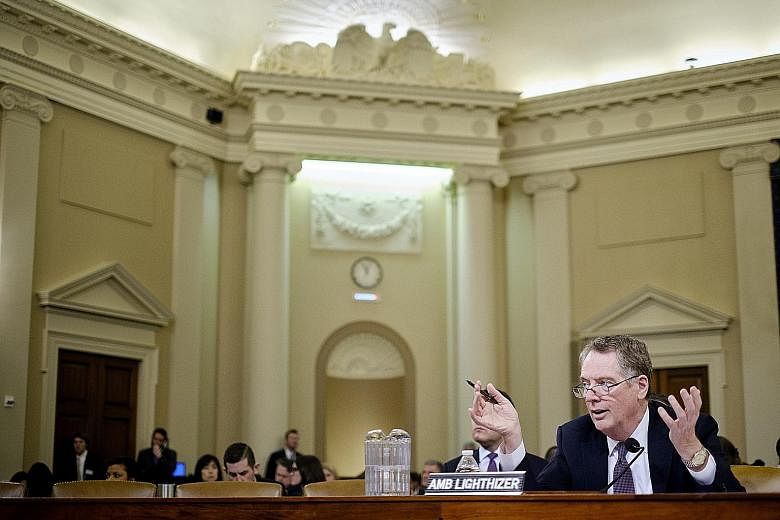WASHINGTON • The United States will need to maintain the threat of tariffs on Chinese goods for years even if Washington and Beijing strike a deal to end a costly tariff war, President Donald Trump's chief trade negotiator said.
US Trade Representative Robert Lighthizer cautioned lawmakers on Wednesday that much work was still needed to nail down a US-China trade agreement, including working out how it will be enforced.
"If we can complete this effort - and again I say if... we might be able to have an agreement that helps us turn the corner in our economic relationship with China," Mr Lighthizer said in his testimony to the House Ways and Means Committee.
The two countries have imposed tit-for-tat tariffs on hundreds of billions of dollars worth of each other's goods, roiling financial markets, disrupting manufacturing supply chains and shrinking American farm exports.
Mr Lighthizer said the US Trade Representative (USTR) office was taking legal steps to implement Mr Trump's decision last Sunday to delay a tariff increase on more than US$200 billion (S$270 billion) worth of Chinese goods that had been set to kick in today.
But the USTR later clarified in a statement that it was not abandoning the threat of increasing the tariffs to 25 per cent from 10 per cent.
Mr Lighthizer said there was a long road ahead to resolving the trade issues, and that tariffs would remain an important tool to push China to make structural policy changes sought by Mr Trump and lawmakers. "The reality is this is a challenge that will go on for a long, long time," he said.
Mr Lighthizer also said that while some progress has been made in the talks, the US needs to be able to take unilateral action to enforce any agreement. "If there is disagreement at my level, the US would expect to act proportionately but unilaterally," he added.
A perennial threat of tariffs would be disappointing news for industry groups, which are hoping to see an end to the trade war uncertainty that has paralysed China investment decisions.
The issues that the US faces with China are "too serious" to be resolved by promises to purchase more US goods, and structural change by China is needed, Mr Lighthizer said.
He said the crux of any agreement will be a mechanism to ensure China is complying with the rules, revealing plans for regular meetings to review the trading relationship between lower-and mid-ranking officials and semi-annual meetings at the ministerial level.
China has offered to purchase an additional US$1.2 trillion of US products over six years, people familiar with the talks have said, which would be welcome relief to farmers and businesses hit hard by Beijing's retaliatory tariffs.
But lawmakers have urged the Trump administration not to allow potential big-ticket purchases to distract him from pursuing an end to what the US alleges are unfair trade practices.
China represents the "most severe challenge" ever faced by US trade policymakers, and congressional support has been "critical in persuading China" to take Washington's concerns more seriously, Mr Lighthizer said.
The US has accused Beijing of forcing US companies doing business in China to share their technology with local partners and hand over intellectual property secrets. China denies it engages in such practices.
Trump officials also object to non-tariff barriers in China, including industrial subsidies, regulations, business licensing procedures, that they say keep US goods out of China or give an unfair advantage to domestic firms.
REUTERS, BLOOMBERG

